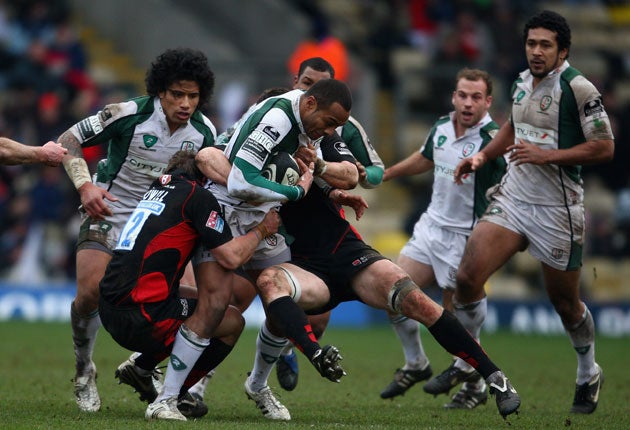Peter Bills: The best sides lack even basic skills

Sometime during 2006, Mike Catt sat down and made some pretty revealing comments about how he saw the modern game and his future role in it.
Catt, even at that stage no spring chicken, conceded his enduring love affair with the game and expressed the hope that he might continue in it even once his own boots had finally been hung up.
As for a potential role, I assumed he was talking about a chief coach job. Not necessarily, was the gist of his remarks. He felt there was a growing need for skills to be coached to players on a one-to-one basis.
“The game has become very structured with players being told where to go on the field and what to do rather than being allowed to do the instinctive things. That has been a massive negative side to professionalism. It has been too structured with not enough attention and focus on skills and decision making.
“I can’t see how that is going to change in the short term because of the physicality and intensity of youngsters coming through now. So this is where I go back to the need for one-on-one coaching to get youngsters to learn and improve their core skills.”
On the evidence of last weekend’s Guinness Premiership match between Catt’s club London Irish and Saracens, Catt’s words from more than two years ago remain as apt today as they did then.
That a side going into such a fixture as leaders of the English Premier League could look so abject when it came to simple basics of the game such as passing the ball properly, defied all logic and belief in a professional sport. The skills on display, certainly by the backs and especially those of London Irish, were so dire that it would have been akin to American Football players dropping most balls thrown to them.
The Irish threequarters hurled passes behind their colleagues’ heads, they threw them along the ground and, on more than one occasion, straight into touch or they threw them so that the next man had to check and secure the ball before trying to re-ignite his run. Inevitably, this proved impossible against one of the modern game’s blanket defences.
That so-called professional players who train every day still cannot perfect the simple art of passing a ball accurately when on the move (off either hand) is an incredible indictment of some of the coaching the game has seen in recent years. This is hardly rocket science, the ability to time a pass and place the ball invitingly in front of the support runner so that his speed and momentum give him a chance of exploiting a gap or the uncertain tackle.
Yet how often do we see this fault in English rugby? The answer is, every week; time and time again. Players hurl the ball anywhere, very often nowhere near the intended recipient of the pass. Undeniably, the passing of most international backs 30 years ago was technically superior to that of the modern day.
It would be trite to suggest professionalism has not produced significant progress in many aspects of the game. Forwards in particular are far more comfortable with ball in hand and can run clever, intelligent lines in both possession and support play that would never have crossed the radar of their counterparts decades ago.
But for some puzzling reason, backs so often look pale shadows of the finest players of the 1970s, for example. Might it be something to do with the fact that physical preparation has, ever since professionalism, assumed a greater importance in preparation than devotion to technical skills?
It would be fascinating to know just how much time coaches spend on the former as opposed to the latter. We all have our suspicions but without revelatory statements by every coach it is hard to know.
Yet none can surely deny the huge importance of the highest standards of technical skills in the modern game. Attacking opportunities are now at such a premium that they need to be exploited whenever they arise. That means that the player with an innate sense of space and timing is of paramount importance in helping to breach the defensive line.
One poorly timed or inaccurate pass can be the difference between seven points and nothing. The ability to put a player away into space with an immaculately delivered pass has always been fundamental to the game’s structure. But it has seldom been as important as in this era of blanket defences and intimidating levels of physical excellence.
This weakness helps explain the inability of so many sides, especially in the northern hemisphere, to break down structured defences.
Subscribe to Independent Premium to bookmark this article
Want to bookmark your favourite articles and stories to read or reference later? Start your Independent Premium subscription today.

Join our commenting forum
Join thought-provoking conversations, follow other Independent readers and see their replies